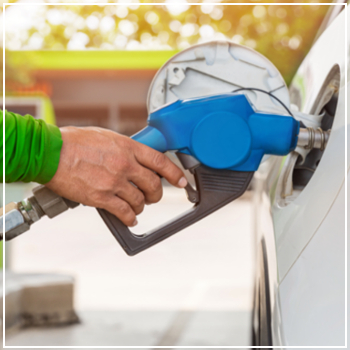A faulty gas cap can lead to fuel evaporation, contributing to air pollution and wasting money. If your gas cap feels loose or doesn't fit tightly anymore, it's likely time for a replacement. This small fix can save you both fuel and hassle in the long run.
While a bit of trash in your car probably won't make much of a difference, carrying unnecessary weight certainly will. For example, bike racks, roof boxes, and bulky items like sports equipment can significantly reduce your fuel economy. Even just 100 extra pounds in your trunk can lower your mpg by about one percent. Larger vehicles may not notice this as much, but smaller cars will feel it more. If you must carry heavy items, try to mount them on the rear of your vehicle instead of the roof to minimize drag. A roof-mounted cargo box can cut your fuel efficiency by up to 17 percent, whereas a rear-mounted carrier might only reduce it by around five percent.
Idling burns more fuel than restarting your engine, plus it produces twice the amount of pollutants compared to driving. In stop-and-go traffic, idling can burn an extra half-gallon of gas per hour compared to turning off and restarting the engine. So, unless you're stuck in traffic, it's better to switch off the engine if you'll be stationary for more than a couple of minutes. Planning your route to avoid areas with lots of stoplights can help you avoid unnecessary idling.
Extreme weather conditions—both cold and hot—can negatively impact your car's fuel consumption. In the winter, start your car and drive gently to warm up the engine gradually, which reduces stress on the motor. Alternatively, using a block heater can speed up the warming process. In summer, park in the shade to reduce reliance on air conditioning. When driving on a hot day, roll down the windows to cool the car naturally instead of relying solely on the AC.
Choosing the correct oil type is crucial for maintaining optimal engine performance. Heavier oils can create excess friction, forcing the engine to work harder and consume more fuel. Always consult your owner's manual to determine the best oil grade for your vehicle.
Your driving habits play a significant role in fuel efficiency. Cruising at speeds above 50 mph increases fuel consumption. Using cruise control can help maintain steady speeds and conserve gas. Avoid aggressive driving behaviors like rapid acceleration and hard braking, which can decrease fuel economy by up to 40 percent. Some tips to improve your driving habits include:
Driving on underinflated tires by just seven pounds can lower fuel efficiency by up to three percent and accelerate tread wear. Make it a habit to check your tire pressure at least once a month, as even minor temperature changes can affect pressure and fuel economy.
Regular maintenance is essential for ensuring your car runs efficiently. Dirty or worn-out components like spark plugs, air filters, and oil can put extra strain on your engine, leading to higher fuel consumption and increased emissions. Keep up with routine service visits to ensure everything is working properly. Additionally, improper wheel alignment can force your engine to work harder, consume more fuel, and cause uneven tire wear. If you've hit a pothole or driven in slick conditions recently, it's worth getting your alignment checked and adjusted.
Whether you need regular maintenance, an oil change, or alignment services, bringing your car to a trusted mechanic like DaSilva’s Auto Body can keep it running smoothly. Don't let small issues escalate into costly repairs—schedule an appointment today to ensure your vehicle stays in top condition."
Remember, every little effort counts when it comes to saving fuel and protecting the environment. SHAOXING KEQIAO FANEVER IMPORT AND EXPORT CO., LTD , https://www.sxfanever.com With gas prices on the rise, many drivers are looking for ways to boost their car's fuel efficiency. After all, no one wants to run out of gas before reaching their destination. While buying a new, more fuel-efficient vehicle isn't always an option, there are several practical steps you can take to maximize your mileage.
With gas prices on the rise, many drivers are looking for ways to boost their car's fuel efficiency. After all, no one wants to run out of gas before reaching their destination. While buying a new, more fuel-efficient vehicle isn't always an option, there are several practical steps you can take to maximize your mileage.Check Your Gas Cap
Manage Your Cargo Load
Don't Idle Unnecessarily
Monitor Your Engine's Condition
Select the Right Oil
Adjust Your Driving Style
Inspect Tire Pressure
Maintain Your Vehicle Regularly
Stay Ahead of Repairs
How to Improve Your Car’s Fuel Economy
